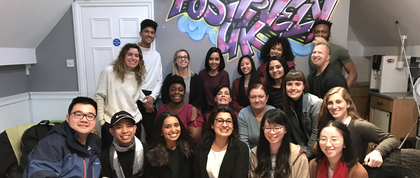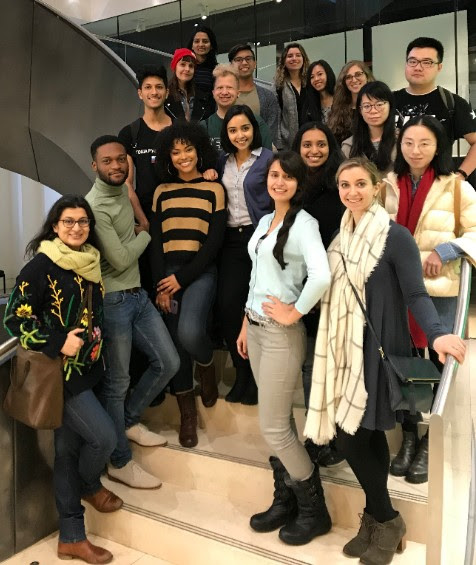
Dr. Farzana Kapadia reports in from London, where she is teaching a J-term course, HIV/AIDS Public Health Promotion
(Pictured above: At a site visit to Positively UK to learn about peer support models for women living with HIV)
Dear Colleagues:
In October 2017, for the first time since the onset of the HIV/AIDS epidemic in the UK some 30 years ago, surveillance data showed an 18% decline in new HIV diagnoses during 2016. This decline was seen across the UK as well as across all social groups. In the London area, there was a 29% decrease in new HIV diagnoses in gay men during 2016. This achievement heralded another accomplishment in London: all of the global UNAIDS 90-90-90 targets (90% of those living with HIV know their status, 90% of people diagnosed are receiving treatment, and 90% of people receiving treatment are virally suppressed) were met and/or exceeded at levels of 90-97-97.
These reports from the UK came out just before I left to teach the course HIV/AIDS Public Health Promotion in London for the January 2018 Winter Intercession. Against the backdrop of these reports, students in the class heard firsthand – from public health practitioners, policy makers and community health workers and advocates – about the many strategies responsible for the decline in new HIV diagnoses.
The class had the opportunity to learn from a programmer manager at Public Health England (PHE) about the extensive HIV self-testing and self-sampling campaigns that were implemented across England.
We also discussed disparities in declines of new HIV diagnoses by race/ethnicity, sex and immigration group. From a public health practitioner at the LSHTM, we learned about how pre-exposure prophylaxis (PrEP) was only available via the internet and more recently via enrollment in an ongoing clinical trial. At site visits to clinics and community based organizations serving people living with HIV, we learned about the benefits of clinic- and community-based peer support interventions. We also discussed how these programs fit into the broader structure of the NHS as well as challenges to their sustainability in the face of ongoing budget cuts. Today, in the UK and in the US, we have a range of comprehensive (behavioral and biomedical) prevention and treatment options that can bring us closer to ending the epidemic.

(Picture: At a visit to the Wellcome Trust to see HIV related media campaigns.)
Given the timing of this class and access to boots-on-the-ground experts, students in the class had an opportunity to think critically about the national and local strategies employed in the UK to optimize uptake of these prevention and treatment options.
Farzana Kapadia, PhD, MPH
Associate Professor of Epidemiology